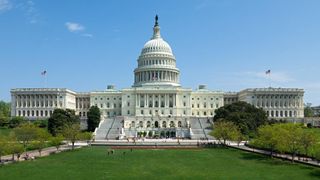Rep. Pallone: Pai Should Have Disclosed Sinclair Call From White House's McGahn

Ranking Energy & Commerce Committee Chairman Frank Pallone Jr. (D-N.J.) has asked FCC Inspector General David Hunt to investigate what he said was FCC Chairman Ajit Pai's failure to disclose a conversation he had with White House General Counsel Don McGahn about the Sinclair-Tribune merger, suggesting it could have been a "coverup."
A spokesperson for Pai fired back.
“This is yet another absurd partisan attack from House Democrats," said the spokesperson. "Chairman Pai said that he would act consistently with the Commission’s ex parte rules, and that’s exactly what he’s done with respect to the status inquiry in question. Given the FCC’s actions involving the Sinclair/Tribune merger, it is unfortunate that House Democrats are still trying to beat this dead horse, especially after their prior accusations of favoritism towards Sinclair were shown to be false.”
“Recent statements by Chairman Pai disclosing a call with White House Counsel Donald McGahn regarding the Sinclair-Tribune merger during a Senate Commerce, Science and Transportation hearing last week — taken together with other relevant events — could very well constitute concealment or coverup and require further investigation," Pallone said in a statement.
Pai did disclose in a Senate FCC oversight hearing last week that McGahn called in mid-July to ask about the status of the deal and in response to news reports. Pai did not elaborate, but the timing clearly suggested it was to ask about Pai's decision to designate the deal for hearing. The FCC voted several days later to designate the deal for hearing, a deal that subsequently blew up.
Pai said McGahn had not weighed in on the decision, but simply wanted information about it.
Pallone is wondering why Pai did not disclose the conversation during an earlier House FCC oversight hearing.
Broadcasting & Cable Newsletter
The smarter way to stay on top of broadcasting and cable industry. Sign up below
Pallone had asked during the July 25 hearing “If the President or anyone in the White House discusses or has discussed the Sinclair-Tribune merger with you or anyone at the FCC, will you commit to disclosing that in the public docket?"
Pai said yes, with the caveat that "we have ex parte rules, because this is now a restricted proceeding. We are limited in what information we can receive and what we can put on the record. But consistent with our restricted ex parte rules, we would be happy to accommodate to the extent we can.”
"Even though the conversation with McGahn had taken place on July 17, eight days before the hearing, Pai did not disclose his discussion with McGahn and he has not subsequently placed a record of the discussion in the public docket," Pallone wrote the inspector general. "Since the discussion occurred prior to the adoption of the Sinclair Hearing Designation Order (HDO), Pai’s reference to “restricted ex parte rules” is irrelevant.
These discussions were not subject to restricted disclosure—as is evident from the fact that Chairman Pai discussed the previously omitted call during the Aug. 16 Senate Committee on Commerce, Science, and Transportation hearing.
Pallone also asked the IG to look at phone records of other commissioners and staff to make sure that they did not have any White House communications that were not disclosed.
Contributing editor John Eggerton has been an editor and/or writer on media regulation, legislation and policy for over four decades, including covering the FCC, FTC, Congress, the major media trade associations, and the federal courts. In addition to Multichannel News and Broadcasting + Cable, his work has appeared in Radio World, TV Technology, TV Fax, This Week in Consumer Electronics, Variety and the Encyclopedia Britannica.

